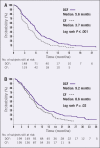Advanced gastric cancer: an update and future directions
- PMID: 19343150
- PMCID: PMC2661550
Advanced gastric cancer: an update and future directions
Abstract
Gastric cancer is a common malignancy worldwide with a high mortality rate. Multiple single agents have produced response rates ranging from 5% to 45% in patients with metastatic gastric cancer. Combination chemotherapy regimens with two or three agents have more than doubled survivorship compared with best supportive care. Recent clinical trials include the evaluation of docetaxel, cisplatin, and 5-fluorouracil (5-FU), showing a survival advantage compared with cisplatin and 5-FU, although with high rates of toxicity, particularly neutropenia and neutropenic fever. The REAL-2 trial evaluated epirubicin and cisplatin with either infusional 5-FU (ECF) or capecitabine (ECX), and epirubicin and oxaliplatin with either infusional 5-FU (EOF) or capecitabine (EOX); results favored the EOX regimen. Oxaliplatin-containing triplets appear to have a favorable safety profile compared with cisplatin-containing triplets. Additional randomized data are available for the oral fluoropyrimidine, S-1. In a randomized trial comparing 5-FU vs. irinotecan plus cisplatin vs. S-1, conducted by the Japan Clinical Oncology Group, S-1 was associated with a favorable safety profile, response rate, and time-to-treatment failure with longer survival compared with 5-FU. The Japanese SPIRITS trial was a phase III comparison of S-1 vs. S-1 plus cisplatin and showed favorable 1- and 2-year survivals and a progression-free survival advantage for S-1 and cisplatin. Cooperative group strategies are evaluating the role of chemotherapy combinations, including cisplatin and docetaxel with biologic agents. In addition, there is interest in developing oxaliplatin-based combinations. The expanding list of potential molecular markers for gastric cancer may provide the opportunity to better understand the biology of the disease and to develop new treatment strategies.
Figures


References
-
- Kattan MW, Karpeh MS, Mazumdar M, et al. Postoperative nomogram for disease-specific survival after an R0 resection for gastric carcinoma. J Clin Oncol. 2003;21(19):3647–3650. - PubMed
-
- Chau I, Norman AR, Cunningham D, et al. Multivariate prognostic factor analysis in locally advanced and metastatic esophago-gastric cancer—pooled analysis from three multicenter, randomized, controlled trials using individual patient data. J Clin Oncol. 2004;22(12):2395–2403. - PubMed
-
- Kilickap S, Dizdar O, Harputluoglu H, et al. Predictive factors for metastasis in patients with gastric cancer. 2007 ASCO Annual Meeting Proceedings. J Clin Oncol. 25(18S):641. (abstr 15056)
-
- Yamada Y, Arao T, Nishio K, et al. Identification of prognostic biomarkers for gastric cancer by gene expression analysis. 2007 ASCO Annual Meeting Proceedings. J Clin Oncol. 25(18S):228s. (abstr 4623)
-
- Keam B, Kim H, Im S, et al. Comprehensive analysis of ERCC, XPD, and XRCC polymorphisms: association with clinical outcomes in patients with advanced gastric cancer. 2007 ASCO Annual Meeting Proceedings. J Clin Oncol. 25(18S):234s. (abstr 4649)
LinkOut - more resources
Full Text Sources
